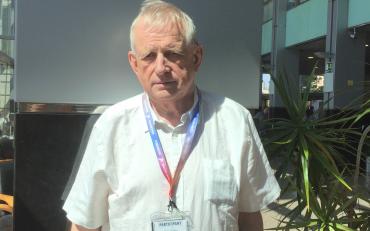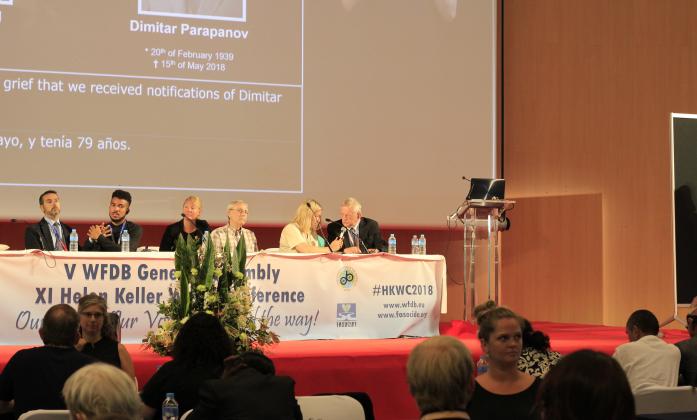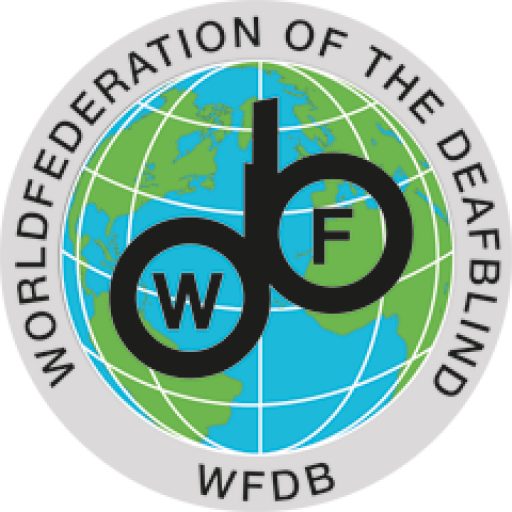 The president of the World Federation of the Deafblind (WFDB) was interviewed in the margins of the WFDB General Assembly and the Helen Keller World Conference (HKWC), in Benidorm, 19-27 June 2018. The events were hosted and co-organised by FASOCIDE – Federación de Asociaciones de Personas Sordociegas de España (Spanish Federation of Associations of Deafblind People) and WFDB, with technical support from IDA. The events were made possible by financial support from Ministry of Foreign Affairs of Norway, UK AID, and Fundación ONCE.
The president of the World Federation of the Deafblind (WFDB) was interviewed in the margins of the WFDB General Assembly and the Helen Keller World Conference (HKWC), in Benidorm, 19-27 June 2018. The events were hosted and co-organised by FASOCIDE – Federación de Asociaciones de Personas Sordociegas de España (Spanish Federation of Associations of Deafblind People) and WFDB, with technical support from IDA. The events were made possible by financial support from Ministry of Foreign Affairs of Norway, UK AID, and Fundación ONCE.

Geir Jensen, WFDB president, told to us:
“It is important to remember that persons with deafblindness are not one group of people that shares the same kind of disability. This is a huge group and I think about it as a scale, where you go from being totally deaf or totally blind to all of variations of deaf and blind. Someone has partial vision, somebody doesn’t see anything but hear a bit better, someone can’t hear but can see better.
All this moving in this scale from being totally deaf and blind and to barely not see or hear, must be recognized and accommodated, accordingly. In Norway, we say that persons with deafblindness is not a homogeneous group of people, there is a huge diversity along the scale.
Each person with deafblindness, needs a specific kind of assistance. If a person with deafblindness does not receive the assistive devices and support that are required by the variety of his/her deafblindness, he/she risks being left in isolation.
Persons with deafblindness are at high risk of being left behind, and in the WFDB we have a lot of people who feel really lonely because of the difficulties in accessing assistive devices and, as a consequence, to communication and participation. First of all, we have the obstacle of having services available to communicate. The isolation caused by this, is a factor that is very likely to make the person acquiring a psychosocial disability as well. In this way, we also understand that inclusion would also improve health for persons with deafblindness.
For each member of this heterogeneous group of persons with deafblindness there is the need of some kind of assistance, which should be customized. We have to fight for the right to have assistive aids that are provided taking into account the needs of each combination and variety of deafblindness. For us, one size doesn’t fit all.
There is also a great need of having trained interpreter-guides, in order to enable persons with deafblindness to participate in society on an equal basis with others. We want, and we are entitled to have the same opportunities, in schools, in job and daily life, as everyone.
Another factor that we need to underline is that you cannot group persons with deafblindness for how they are more deaf or blind, but we should see how they function and communicate, because this happens in many different ways.
The organization for deaf or blind people do not have the necessary knowledge and lived experience on how to address issues related to deafblindness. It’s very different to be deaf or blind from being a person with deafblindness. To be able to establish correct information, we need to look away from those two disabilities and recognise deafblindness as a unique disability. If we reach this point, we can hold governments accountable, and they would include this topic into their budget as a separate budget line.
Aiming to achieve political participation for persons with deafblindness, means that we will have the opportunity to uncover and share knowledge on how to efficiently design policies that will allow us to be included and actively participate in all aspects of life.
The global report on deafblindness that the WFDB is about to publish, will provide a good picture of the situation today, based on a mix of existing research data, literature and internal surveys within WFDB member organizations. As a fully participatory report, it will present the baseline in a monitoring and accountability tool, measuring the development connected to the implementation of the CRPD and the SDGs.
We aim to present the report in September, and repeat the work every four years, to track the development of both recognition and inclusion of persons with deafblindness.
Using continuously updated information, and expanding the scope of available data, we will fight for the recognition of the unicity of our disability and its reflection in policies and programs.
The global report will be instrumental for our efforts to hold governments accountable to follow up on their promises through the CRPD, the SDGs, and other Human rights instruments.”
